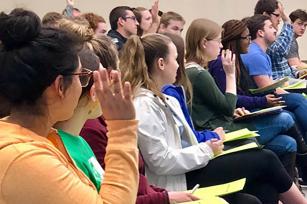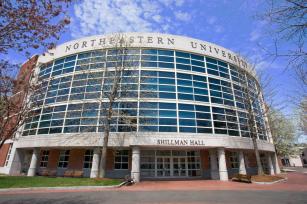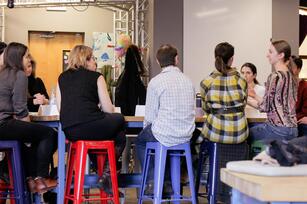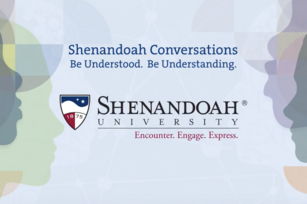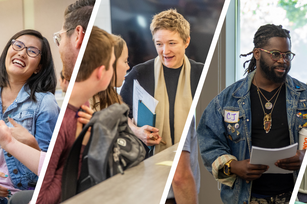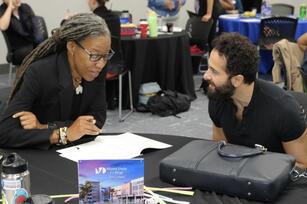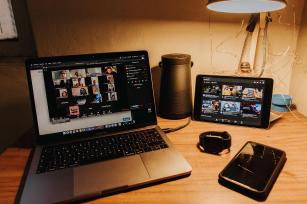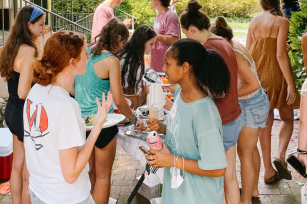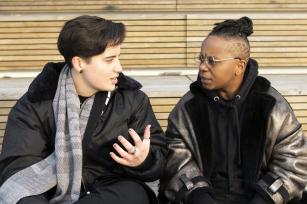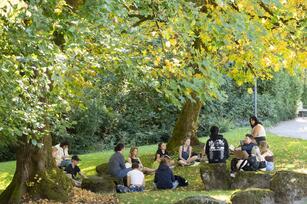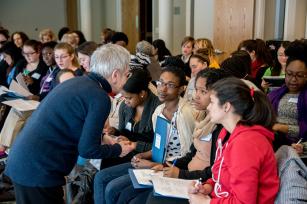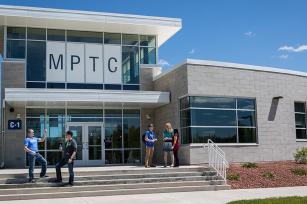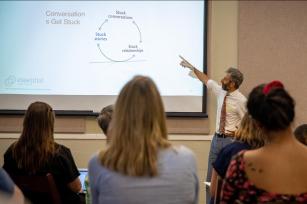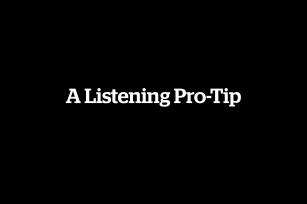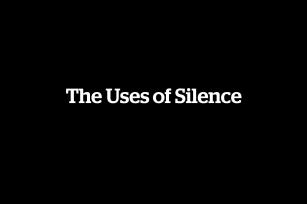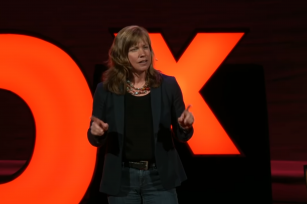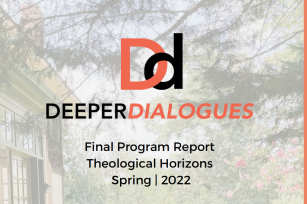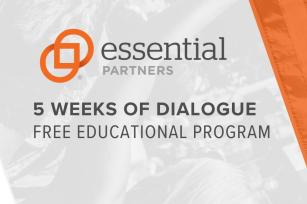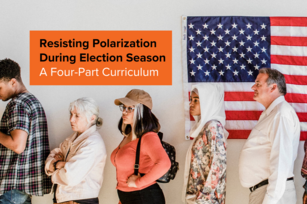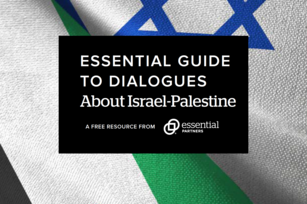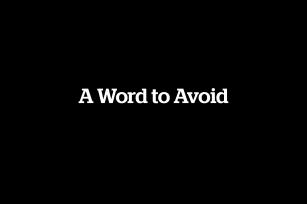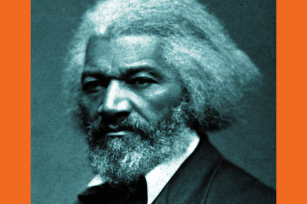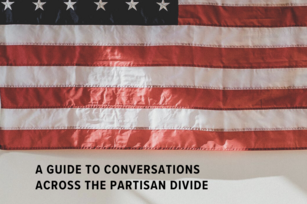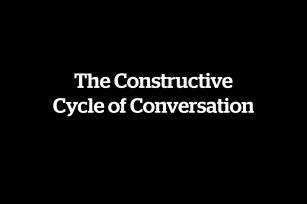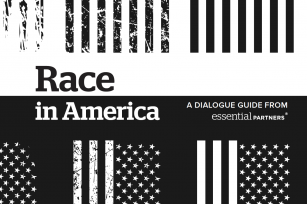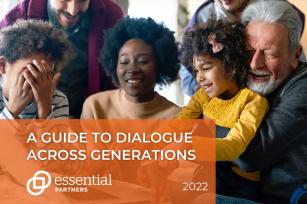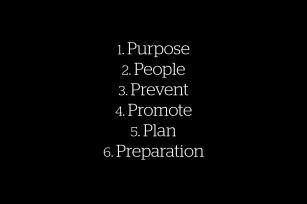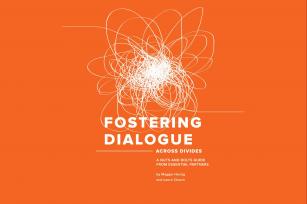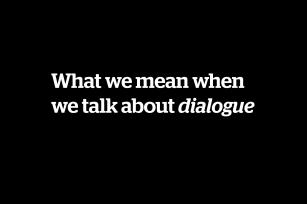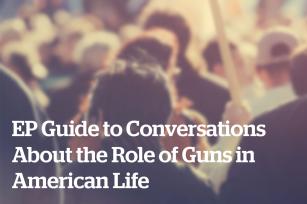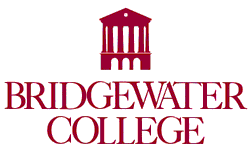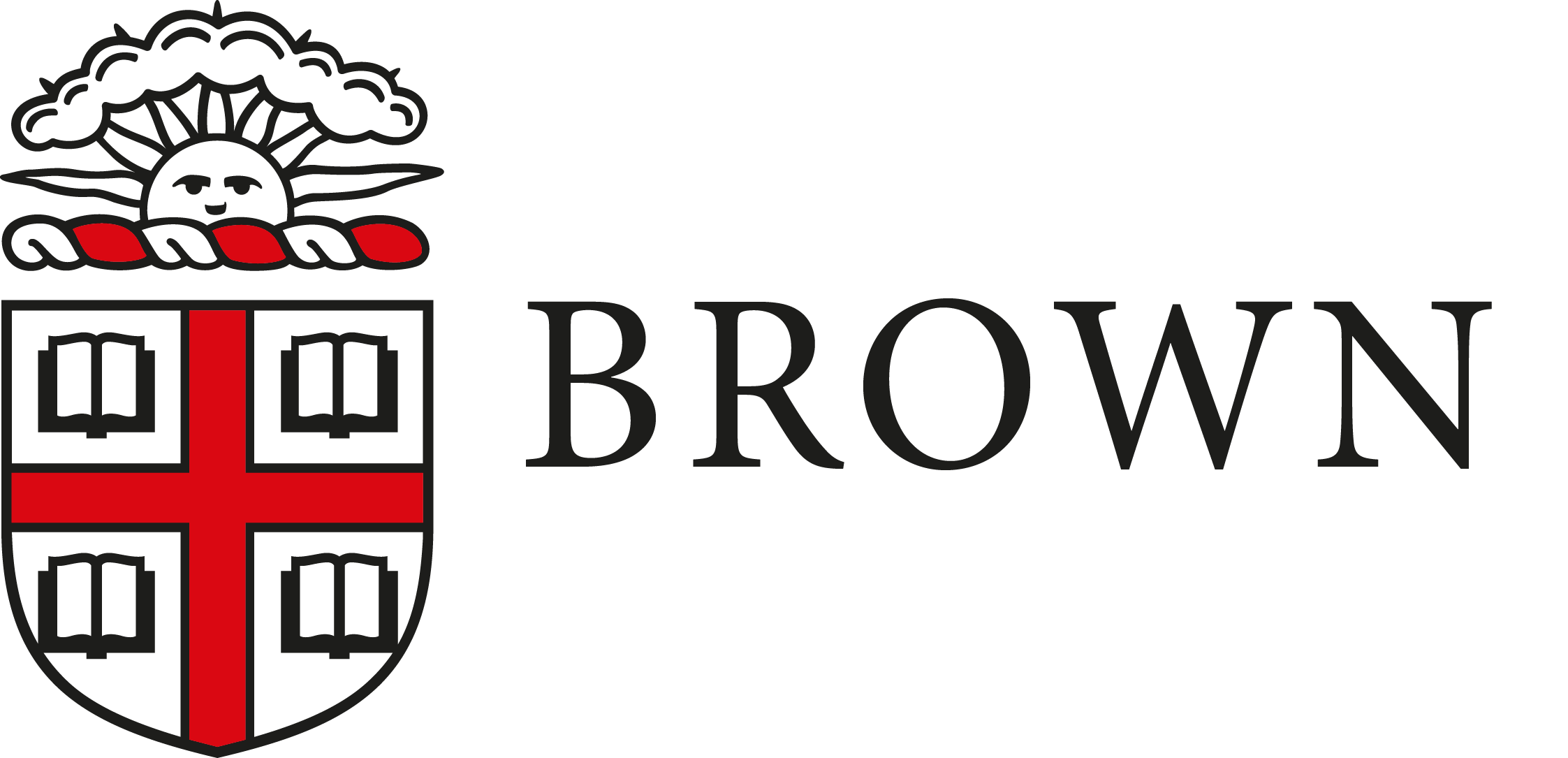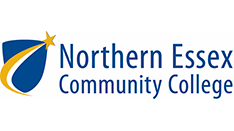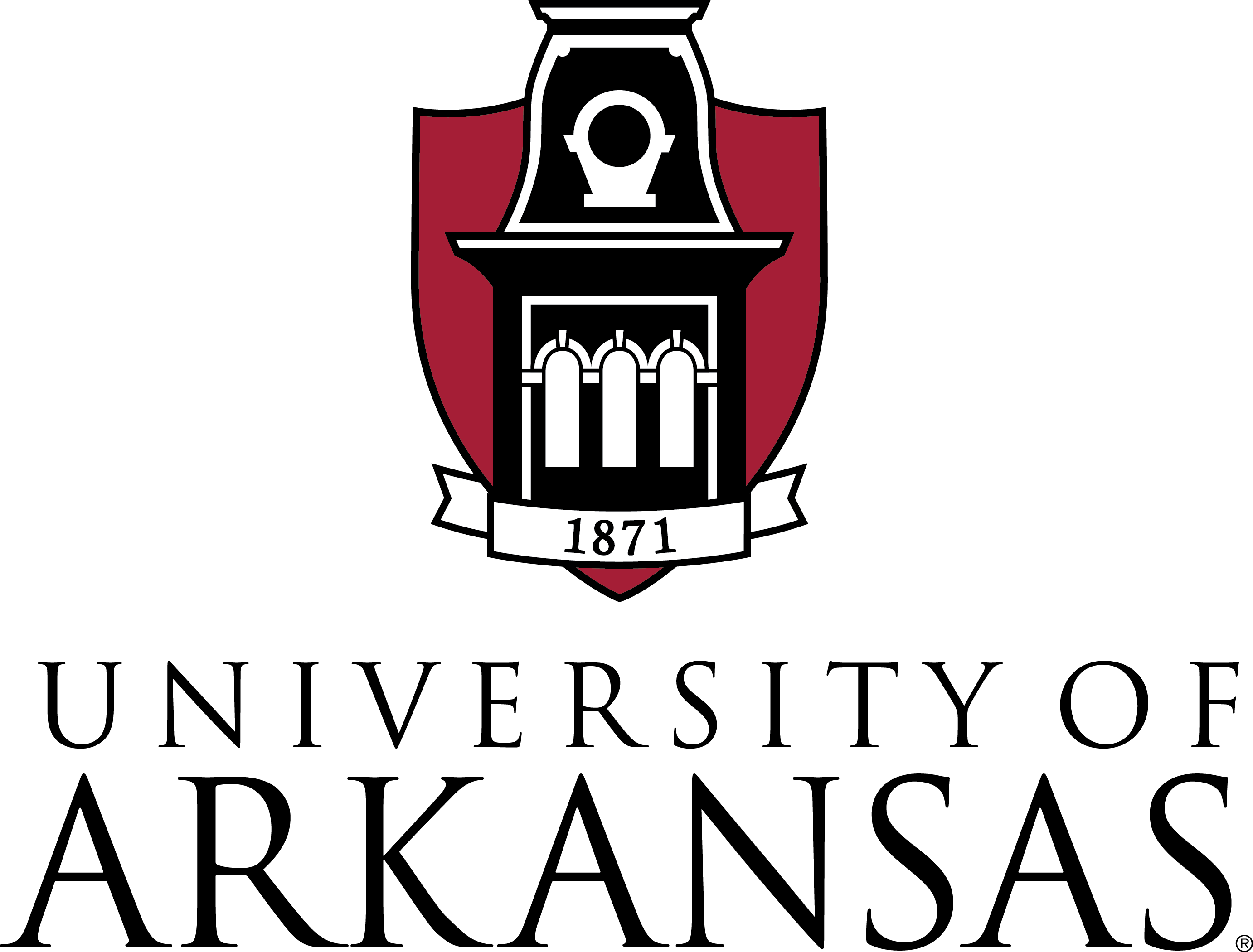
Breadcrumb
- Essential Partners
- Who We Work With
- Higher Education
Dialogue in Higher Education
Colleges and universities bring people with diverse backgrounds and intersecting identities together to build strong intellectual and social communities. It is an extraordinary feat. And to make it all work in a pressurized environment, administrators, faculty, and students routinely navigate sensitive, complex, and explosive issues, including:
- Political partisanship
- Race and ethnicity
- Gender and sexuality
- Religious differences
- Economic inequality
- Israel and Palestine
- Climate change
- Intellectual diversity
For thirty years, Essential Partners has worked with campuses large and small, with institutions public and private, and with stakeholders ranging from faculty and graduate students to undergraduates and staff. By equipping stakeholders with our trademark Reflective Structured Dialogue® approach, we have helped create more inclusive and resilient campuses that better prepare the next generation of leaders for a diverse, complex, interconnected world.

The Dialogic Classroom
Can we make space in the classroom for students to develop convictions—to identify what they believe, understand why they believe it, and become willing to share it—while simultaneously inviting them to hold those convictions with humility—with openness, curiosity, and willingness to listen to others?
Dialogue in the classroom deepens learning, improves student retention, and strengthens interpersonal connections. It can also help students strike the crucial balance between humility and conviction that enables intellectual rigor and nurtures the health of a diverse free society.
Faculty can learn to lead discussions about even the most divisive and emotional topics—conversations that help students understand, articulate, and interrogate their own values and beliefs.
“Students in the classes where I’ve used dialogue make a conscious effort to listen with resilience and to speak about their own experiences instead of just repeating talking points,” says Jill DeTemple, a faculty member at Southern Methodist University. “They are more likely to say that they don’t know something, and also more likely to ask a question when they need an answer.”
The dialogic classroom isn't a new method of classroom management. It's a paradigm shift.
Learn more about our classroom approach or contact us about faculty training.
The Dialogic Campus
Can you imagine a campus environment where no topic is out of bounds? Where conversations about crucial issues are robust but respectful? Where different views are not only accepted but invited? Where strong relationships bolster resilience in the midst of conflict?
Campuses have become focal points for some of the most explosive conflicts in our civic life, around issues like gender, immigration, gun violence, religion, and race. But those differences don't have to become divisions. For 30 years, Essential Partners has trained administrators, faculty, and students across the globe to foster campus cultures that embrace differences.
Essential Partners can help transform the relationships among students, administrators, faculty, and institutional leadership on your campus.
Want to learn more? Contact us for a free consultation.
Impact Stories

Noga Shemer, Associate Professor in Anthropology“Students come to university so they can think deeply about issues that matter. They are the future, and the stakes are high. They want spaces where they can think these things through.”
University of Connecticut

Alex Lyford, Assistant Professor of StatisticsI can't possibly overstate the positive effects the Dialogic Classroom training had on the curriculum and approach to my Introduction to Data Science class. The difference in the course from a year ago and now is night and day. My lectures are now filled with meaningful discussion and discourse—often related to sensitive topics that I wouldn't have dared touching without the training. Student feedback about these discussions has been overwhelmingly positive, and there is no chance that I would have had the wherewithal or initiative to revamp the course in such a dramatic manner without the training.
Middlebury College

Undergraduate StudentI learned to expect the best of my classmates, even when we don’t agree. I can’t write off their opinions anymore, despite our disagreements.
Bridgewater College, Virginia

Megan DeFranzaThere is a need not only for safe space within our churches but for our church leaders who often feel alone, or who may feel their job could be at risk if they engage in controversial conversations. How are they to make safe spaces in their own congregations for healthy dialogue if they rarely experience safe space to do the same?
Gordon College, Massachusetts

Katie Shear, Civic Engagement CoordinatorUsing what we learned from Essential Partners, staff were able to model effective and respectful communication for students. A next step would be for us to help students employ some of these methods themselves. The staff not only gained skills in communication but also left feeling supported by each other in the work that we do.
Southern Vermont College, VT

Undergraduate StudentAt the beginning of the semester, there was not much participation in class. But by the end, almost everyone had something constructive to add every day.
Bridgewater College, Virginia

Janet Lansberry, Weissman Center Assistant DirectorThis was probably the most profound workshop that we ever brought to campus. It offered a really unique foundation in personal insight.
Mount Holyoke College, MA
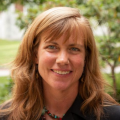
Dr. Jill DeTemple, Religious Studies FacultyAfter using this approach in my classroom, I am now more willing, and more able, to engage students in meaningful conversations about potentially contentious issues. Whereas I used to nod toward things like homosexuality in religious life, interfaith marriage, or the role of government in reproduction, now I build these conversations into the class so students can learn to speak about their experiences, and so they learn to listen and learn from those with whom they might disagree.
Southern Methodist University, Texas

Dr. Brooke Vuckovic, Clinical Professor of Leadership“The Dialogic Classroom is by far and away the most skillful and thoughtful professional development I have had in years as an educator.”
Kellogg School of Management

Anjali Bal, Associate Professor of MarketingWe talked about where we are in the world right now, so we talked quite a bit about polarization. Essential Partners showed how these conversations are becoming more taxing and challenging because of that polarization. These were some first steps in terms of how we can start to have those conversations.
Babson College, MA

Undergraduate StudentI notice that my classmates take much more care when speaking about people who practice other religions. They make fewer assumptions, and they’re more careful with their words to make sure to avoid unintentional connotations.
Bridgewater College, Virginia

Beth MendozaDialogue gets more results. It makes decision-making easier. It makes creating participation easier … our greatest organizational impact has been more contributions as well as more effective and efficient meetings.
Moraine Park Technical College, Wisconsin

Etionette Nshirmirimana, Burundian Master TrainerI realized that by using the “dialogue” approach, people could talk of what is deep in their heart, especially things that have harmed them.
Burundi

Ben Meoz, VP for Student Life and Dean of Students“We want to cultivate genuine curiosity among students so that they really open themselves to the needs of others and also feel like others have an awareness of what their needs and experiences are.”
Lewis & Clark

Noga Shemer, Associate Professor in Anthropology“When I started bringing the RSD model into the classroom, it changed everything, and I had this overwhelming sense of what the classroom could be. The student feedback was unlike anything I had seen before. Students said, ‘Wow, why haven’t we had the chance to do this before? And why don’t we get to do this more often in our education?’”
University of Connecticut

Anjali Bal, Associate Professor of MarketingOne of the things that we talked about was the ability to hear another person’s point of view, even if our minds aren’t changed. We have to remember that any sort of movement is movement. If we don’t acknowledge small movement, then we just stay on two different sides, and it’s all black and white, and we don’t hear each other.
Babson College, MA

Undergraduate StudentThe most significant thing for me was learning how to ask for more information rather than trying to persuade a person to think differently. I also learned helpful dialogue tips, which are more effective during difficult conversations. If I encounter a difficult dialogue with any of my residents, I plan on using the techniques I learned in this workshop to facilitate those talks.
Northeastern University, MA

Undergraduate StudentAs a pharmacy major, I do not receive much training on how to handle difficult or controversial conversations. I think that this training will help me not only in my duties as a resident assistant, but in discussing medications and therapies with future patients when the conversation becomes difficult.
Northeastern University, MA

Nicki Glasser, Policy CoordinatorWhat surprised me was how much you could transform a relationship during a three-hour conversation.
Transformation Center, Massachusetts

James Rucker, Faculty MemberIt is really different than it was before. The Essential Partners process has given me the power to be heard and be seen. It’s unreal.
Randolph College (VA)

Jamie Kleinman, Associate Professor“I want every STEM class to have a dialogue. Imagine if the students had more practice doing this in more of their classes. It really speaks to the nature of approaching this from a systems perspective and how big a need there is for that.”
Department of Psychological Science, University of Connecticut

Janet Bixby, Director of Community Dialogues“Essential Partners has the magic sauce—its trainings. Working with Essential Partners and Community Dialogues has enabled us to say, ‘Hey, we have tools to help us be able to do this, and we have ways to do this. We can address these things.’ That's been incredibly useful and powerful.”
Lewis & Clark

Kim Davidson, OmbudsI’ve gained not only confidence but tools. The Essential Partners training was worth every penny.
Oberlin College, Ohio

Patrick Hale, director of Multicultural and Identity ProgramsOne of the things that’s so crucial to even fostering dialogue around diversity, equity, and inclusion is creating opportunities for folks to engage in deep reflective self-awareness.
Babson College, MA

Jonathan Noyalas, Director of the McCormick Civil War Institute“RSD has been the most transformative thing in my 21 years of teaching. … Students have a greater desire to open up in class about things because they know that a Noyalas class is a safe environment. ‘I can say things here. I’m not going to be judged. I understand I’m contributing to a broader conversation.’”
Shenandoah University

Teresa Grettano, Associate Professor and Director of the First-Year Writing programFacilitated dialogue creates a classroom atmosphere in which exploring uncomfortable issues and asking difficult questions is an expected part of the process, and it allows students space to engage each other without fear of the vitriol common in our public discourse.
University of Scranton (PA)

Undergraduate StudentI started to trust everyone in the class—I felt heard and I felt that people wanted to listen. As a result, I wasn’t afraid to let my past come out and let people learn from what I have been through.
Bridgewater College, Virginia

Elizabeth Zehl, Undergraduate StudentEssential Partners' process gives people the space to be intellectually curious and to engage with others on important issues in a way that also benefits their own understanding of what they believe.
Randolph College (VA)

Undergraduate StudentThe professor was able to engage every student. She encouraged them to present new ideas. Dialogue helped create an environment that really deepened the understanding of the material.
Southern Methodist University, Texas

Bob Bordone, Expert and AuthorEssential Partners does the best work in the field of dialogue and communication.
Harvard Negotiation & Mediation Clinical Program, Co-Founder

Undergraduate StudentWe tackled really difficult topics and this helped everyone know each other and understand each person's individual perspective. Over the course of the semester, I became much more comfortable engaging with my classmates—specifically because of the peer dialogue groups.
Bridgewater College, Virginia

Undergraduate StudentDialogue challenged us to think more deeply about the class topics. Talking about our own thoughts and experiences in relation to the topic also challenged us to think about our own views and articulate them more clearly.
Gordon College, Massachusetts

Undergraduate StudentEvery opinion was accepted. No one felt judged or uncomfortable talking to one another. These have been, by far, the best classroom discussions I have ever had.
Bridgewater College, Virginia

Undergraduate StudentDuring one dialogue, as we were reading The Joy Luck Club, we were asked to discuss our relationship to America. There were students who grew up in the United States and also those who hadn’t—and I was surprised to hear that everyone had equally complex relationships with the topic.
I appreciated being able to hear and express the full depth of our own context before delving into a discussion about first-generation immigrants.
Gordon College, Massachusetts

Undergraduate StudentI have learned how to not be offended and to be better prepared to receive other people's communication. You don't have to agree, but you can respect the other person.
Randolph College (VA)

Program ParticipantThis is the best adult learning experience I have had in the past five years. I wanted to learn new skills—I did!

Undergraduate StudentIt’s nice to talk about things that we encounter all the time but rarely get talked about. This made me hopeful that there are people who are willing to talk about serious issues.
Dartmouth College, New Hampshire

Undergraduate StudentI learned a lot about myself from others’ perspectives—it was comforting to hear similar values and ideas expressed, yet really eye-opening and intriguing to hear very different philosophies.
Dartmouth College, New Hampshire

Megan DeFranzaHere safe space was created for pastors and church leaders to wrestle with topics like evolution which are all too often “off limits” or believed to be antagonistic to the faith.
Gordon College, Massachusetts

Undergraduate StudentI feel more comfortable participating in class and less defensive when other students disagree. And because I learned more from my fellow students about their views, I now feel less competitive with them than in other classes.
Bridgewater College, Virginia

Anne Hopkins Gross, Dean of StudentsThe Essential Partners workshop was a way of building up our ability to talk about more difficult issues, such as poverty and GLBTQ safe spaces. It was really the foundational entrée into those more challenging issues of race, ethnicity, sexuality, and gender. People walked away feeling much more confident about having difficult conversations.
Southern Vermont College, VT

Program ParticipantI felt an amazing sense of accomplishment when the Essential Partners training ended; that I'd done something important for my community and something important for me.
Massachusetts

Cricket Fuller, The Christian Science MonitorThis wasn’t a policy debate [about guns]. Instead, two people whose backgrounds and views diverged in almost every way possible shared a moment of honesty that struck at the heart of the matter.
Boston, Massachusetts

Program ParticipantI did not anticipate having as many concrete takeaways as I do. I feel there is an immense practical application.

Lucinda Garcia, Researcher, Educator & AdvocateThe Dialogic Pedagogy Fellowship at Tufts University, in collaboration with Essential Partners, gave me transformative social-emotional learning and facilitation skills to support meaningful dialogue in the classroom. I’m excited to apply what I’ve learned to design questions that invite personal narratives, value-based discussion, and comfort with complexity—all in service of building a classroom climate where productive dialogue and engaged learning can flourish.

Amy Cottrill, Birmingham-Southern CollegeThe past few years in our country have been the most divisive and alienating in my lifetime, which can be a tremendous challenge in the classroom that aims for community, shared experience, and listening with empathy to opinions that are different from one's own. The Essential Partners workshop I attended provided invaluable tools to meet the challenges of teaching today. It helped me reimagine the classroom as a place to help students learn the essential tools of living and learning in community and interconnection, skills that are necessary in every single area of life. I have no doubt that my teaching has been dramatically reshaped in light of my introduction to structured dialogue and I feel like I have so much more to offer my students because of that.
Birmingham, AL
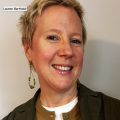
Lauren Barthold, Philosophy FacultyI’ve learned that it is not enough to announce my commitment to dialogue and expect students to know what I mean; I need concrete exercises to allow students to learn how to do it.
Endicott College, Massachusetts

Karen Ramirez, Director of the CU Engage ProgramWe get more requests [for campus dialogue] than we could ever respond to.… I’m proud that our work on campus is actually kind of unusual, because it doesn’t support just one population. It supports everyone—students, staff, faculty, graduate students. I don’t know if there are other University of Colorado projects going on that hit all of our campus population.
University of Colorado, Boulder
